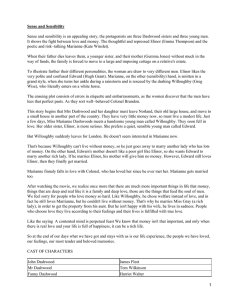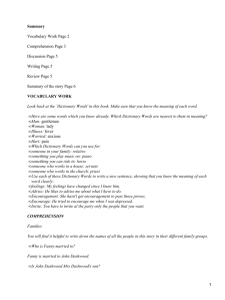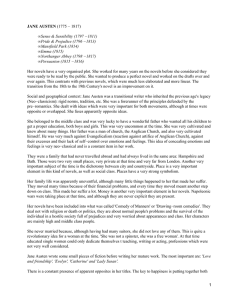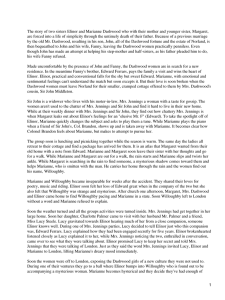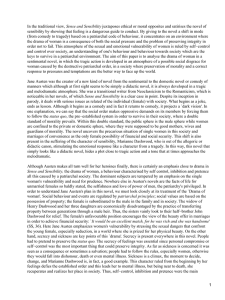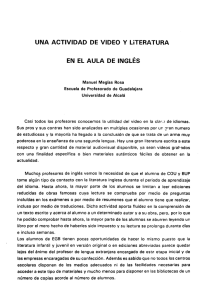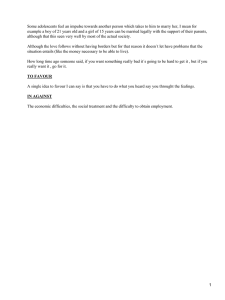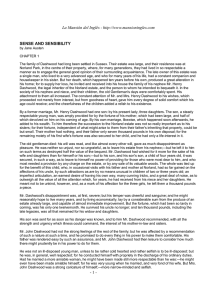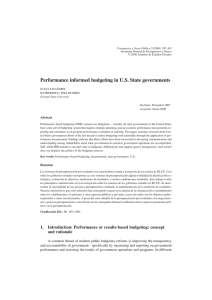Sense and sensibility; Jane Austen
Anuncio
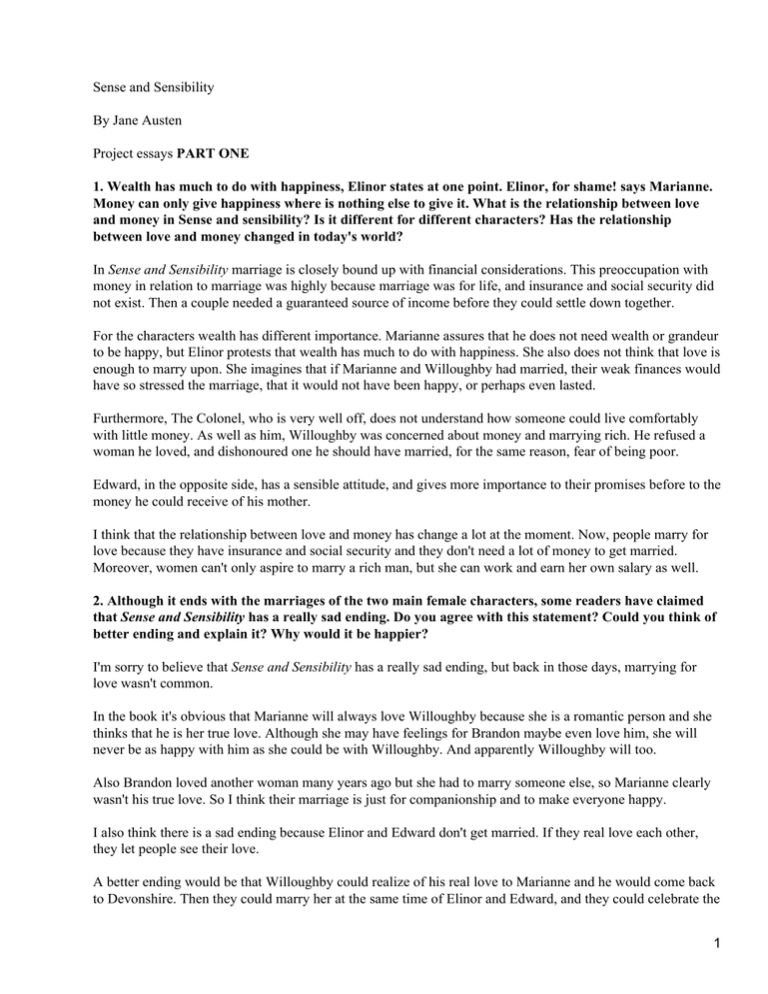
Sense and Sensibility By Jane Austen Project essays PART ONE 1. Wealth has much to do with happiness, Elinor states at one point. Elinor, for shame! says Marianne. Money can only give happiness where is nothing else to give it. What is the relationship between love and money in Sense and sensibility? Is it different for different characters? Has the relationship between love and money changed in today's world? In Sense and Sensibility marriage is closely bound up with financial considerations. This preoccupation with money in relation to marriage was highly because marriage was for life, and insurance and social security did not exist. Then a couple needed a guaranteed source of income before they could settle down together. For the characters wealth has different importance. Marianne assures that he does not need wealth or grandeur to be happy, but Elinor protests that wealth has much to do with happiness. She also does not think that love is enough to marry upon. She imagines that if Marianne and Willoughby had married, their weak finances would have so stressed the marriage, that it would not have been happy, or perhaps even lasted. Furthermore, The Colonel, who is very well off, does not understand how someone could live comfortably with little money. As well as him, Willoughby was concerned about money and marrying rich. He refused a woman he loved, and dishonoured one he should have married, for the same reason, fear of being poor. Edward, in the opposite side, has a sensible attitude, and gives more importance to their promises before to the money he could receive of his mother. I think that the relationship between love and money has change a lot at the moment. Now, people marry for love because they have insurance and social security and they don't need a lot of money to get married. Moreover, women can't only aspire to marry a rich man, but she can work and earn her own salary as well. 2. Although it ends with the marriages of the two main female characters, some readers have claimed that Sense and Sensibility has a really sad ending. Do you agree with this statement? Could you think of better ending and explain it? Why would it be happier? I'm sorry to believe that Sense and Sensibility has a really sad ending, but back in those days, marrying for love wasn't common. In the book it's obvious that Marianne will always love Willoughby because she is a romantic person and she thinks that he is her true love. Although she may have feelings for Brandon maybe even love him, she will never be as happy with him as she could be with Willoughby. And apparently Willoughby will too. Also Brandon loved another woman many years ago but she had to marry someone else, so Marianne clearly wasn't his true love. So I think their marriage is just for companionship and to make everyone happy. I also think there is a sad ending because Elinor and Edward don't get married. If they real love each other, they let people see their love. A better ending would be that Willoughby could realize of his real love to Marianne and he would come back to Devonshire. Then they could marry her at the same time of Elinor and Edward, and they could celebrate the 1 wedding together. Moreover they will live happily because Willoughby would recuperate most of his money back and also Edward. Then they would buy the sister's old house in Norland and they would live all of them there with their children. A part form that, Colonel Brandon would also be happy because he would marry a sensible woman who really would love him and who also would like poetry and music. It would be a better ending, because then, all the characters would be happy, would live peacefully and would have money to live properly. 3. Compare the three best−loved men in the story −Edward Ferrars, John Willoughby and Colonel Brandon− both in character and personal evolution through the story. There are three important men in the story, Edward Ferrars, John Willoughby and Colonel Brandon. Although all of them fall in love with Dashwood sisters, they are very different. Firstly, there is Edward Ferrars, who is not attractive or dashing and he is not a smooth talker. He is also not very interested in art or literature, but he is honest, loyal, sensible and friendly. Moreover, he will sacrifice his own feelings to do what is right, thinking of others before him. Secondly, there is Willoughby, a young, attractive, graceful man and a lover of good literature. He falls in love with Marianne, but money is more important to him, as he enjoys living well. Willoughby is a rake, seducing women without thinking of either their feelings or the consequences of his actions. He favours money over love, and treats those who love him with indifference. He also treats Marianne terribly, ignoring her letters, treating her coolly at a party and sending her a cruel last letter in which he denies any relationship. However, when Marianne is ill, he realizes the mistakes he has made, and apologizes to Elinor for all the pain he caused. And thirdly there is Colonel Brandon, an attractive and distinguished old man. He is quiet, dependable and caring, but these good qualities seem to increase as time goes by. He begins to love Marianne although the girl thinks he is too old to be a lover. Instead, he does not try to change her mind and he acts like a hero by bringing Marianne her mother when she falls ill. At the end of the story he gets to marry her. 4. In page 54 of the book, there is the letter that Marianne receives from John Willoughby. Write the previously sent letter written by the girl taking into account the reply she receives and what you think she must have said in those sad and desperate moments for her. Dear Mr. Willoughby, I have never been so desolate so I am. My feelings towards you have broken yesterday when I saw the way look at me. I though you love me because the time we spent together in Devonshire was wonderful and since then I have loved you desperately. I have been crying all the night and I am still crying because I don't understand anything. You made me expect that we will meet again to continue our relationship, and one day before you left, you told me that you have to tell me something important. However, now, you marry another woman without thinking in the true loved we read in the poems together. Is for that, I want all my letters and my lock of hair back, as you don't deserve them. I really believed you love me, because I saw it in your eyes every day and you begged me a lot of time for my 2 lock of hair. I thought these little things describe a big love between two people. I fell completely in love with you and you knew that you were the most important person for me, but now you have broken my heart. You made me be the unhappiest person in the world, and I'm not going to love anyone again. All things considered, I don't think you could forget me so fast, although your marriage and it is because of that I am writing you. I want an explanation or some reasons that can help me to understand why you don't answer my letters and why you made me think that you love me. Your miserable friend, Marianne Dashwood PART TWO 1. Write your personal opinion on the book, saying why you liked or disliked it. Personally, I think that Sense and Sensibility it's a really good book because it was ultimately a delightful entertainment. I liked it because the plot is also good − boy meets girl, boy and girl fall in love, boy scorns girl − and the major characters were well developed and dynamic. There are only two things I didn't like. Firstly is that Marianne ended up getting married with the one she didn't loved. And secondly that while there was conflict between characters, Austen didn't allow them to really address the conflict directly and it makes more difficult for the reader to discern any true sense of feeling. Apart from that, I would recommend this book to anybody because I loved it, even though it was the first Jane Austen's book I have read, she is one of my favourites authors until now. 3
